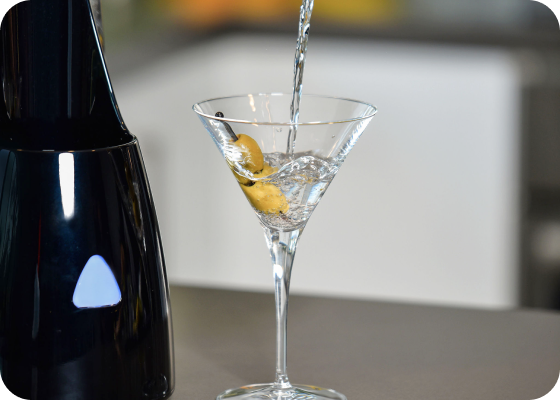Pouring vodka through a Brita filter is a common hack for college students and DIY type folks. There’s some fun to be had in taking cheap alcohol and making it marginally better; but does it actually work, or does filtering the alcohol just make us feel like we’ve accomplished something? And, does it work on any other kind of alcohol? What about whiskey? Or wine?
In short: No. It doesn’t work. It doesn’t improve the taste in a way that most people can notice and it’s not cleaning up your drink. Time to stop playing at high school level science experiments and pour yourself a good stiff drink.
Filtering Wine With a Brita
If it works for vodka, why not wine? Especially red wines that are known to have high levels of sulphites. “It’s better than nothing, right?” Asks a participant at winemakingtalk.com. The answer is a swift and definitive NO.
Carbon kills the flavors and tannins in your wine, so you’re actually doing damage, not improving it.
What could you use instead?
The Üllo filter is like a Brita filter but made to fit specifically into your carafe or wine glass. It uses a “proprietary polymer technology” that is NOT carbon, so it won’t kill your wine in the same way that a Brita does The device filters out the sulphites and aerates at the same time. At about $2 a pop (whether you choose the bottle sized or glass sized filter) and the fact that the filters are adding to the landfill, you might be better off just opting for a slightly better bottle of wine.
Charcoal Filtering Whiskey
By contrast, filtering whiskey with charcoal, called the Lincoln County Process, does work, and is done at the industrial level (before putting it in the casks to age) by almost all producers of Tennessee whiskeys. There is, however, a difference between charcoal and activated charcoal (carbon) which is what Brita filters use.
Experts in whiskey advise AGAINST using activated charcoal in filtering whiskeys because it takes out the flavors you want. But, lots of hobbyists and experimenters swear that it smooths out the whiskey and improves the drinkability.
For this one, it comes down to personal taste.
Vodka Brita Filter MythBusters
But DOES it work for vodka though? I mean, that’s what everyone is trying it with. Magically turn Smirnoff into Grey Goose for only $40 worth of filters and a wasted few hours. Can you think of a dumber way to spend your time or money?
Because people will try anything, in 2006 the show MythBusters set out to get the last word on whether carbon filtration of vodka made a difference, or not. They passed their control vodka through a Brita Filter six times and then had the results tasted by a World Spirits Competition judge and two “lesser” experts.
Anthony Dias Blue, the World Spirits Competition judge, nailed it in his analysis of the samples. The “lesser” experts, not so much.
Watch the video to see the results:
In the end, the expert and the scientist had the last words:
Anthony Dias Blue, vodka expert and Executive Director of the San Francisco World Spirits Competition said this of the flavor and tasting experience:
“Passing a low end vodka through a Brita Filter will make it better, but it won’t make it a top shelf vodka”
Dr. Byron, who did lab testing on whether there was actually any change made to the vodka at the chemical level found this:
“… the gas chromatograph showed that there are, really, absolutely no difference in chemical composition between filtered vodka and low end non-filtered control vodka.”
The MythBuster’s verdict: BUSTED: The Brita does not substantially improve vodka.
While a real expert might be able to tell some difference after filtration, the average drinker doesn’t notice much improvement. And at $20 a pop for a three pack of filters, $40 for the six you need to get through the filtration process, you’re better off buying more expensive vodka.
And also, there’s no quantifiable difference in the output, so… why bother?
Stop wasting filters on Smirnoff and pour some water through that Brita. You’ll need it to treat your hangover from drinking that crap.
How to Make Cheap Vodka Taste Better
So, if using a Brita filter on vodka and other alcohols, at best, results in, “meh” differences, what does work? Charcoal filtering might remove some of the odors and tastes in your drink, but it’s clear that there is no quantifiable difference in the removal of actual impurities, which is the negative that people are trying to impact with the Brita filter in the first place. And the reality is that most alcohols are filtered before they’re bottled.
Technology to the rescue: Barmuze!
It turns out that a technology long used to clarify fluids at the industrial level (palm oil, bio-diesel, and most recently fracking water) works spectacularly on alcohol as well. Yes, it improves the taste and reduces the harshness, but more importantly, it reduces impurities. By significant amounts, according to a university study. The changes at the molecular level are responsible for the improved sipping experience, but the vaporized impurities are the real win for those concerned about the health impacts of things like methyl acetate in their spirits.
Ditch the Brita, buy a Barmuze instead. No filters to change (and throw into a landfill), and lab verified reduction in impurities.
Your welcome.
